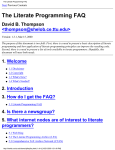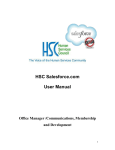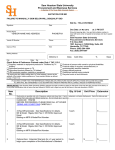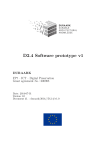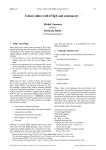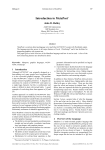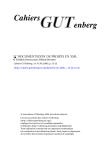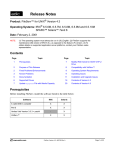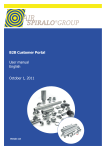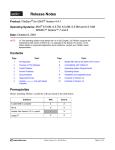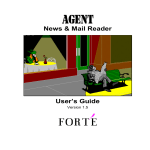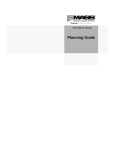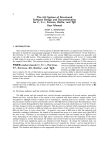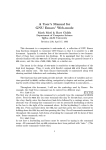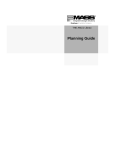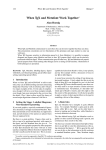Download Literate Programming FAQ
Transcript
Bijlage J Literate Programming FAQ 159 Literate Programming FAQ version 1.0.1 David B. Thomas 15 october 93 Welcome to the Literate Programming Frequently Asked Questions List This version was created Fri 10/15/1993 and should considered stale after 90 days. Information contained in this document is the best available at preparation. Disclaimer: ‘This FAQ is presented with no warranties or guarantees of ANY KIND including correctness or fitness for any particular purpose. The author of this document has attempted to verify correctness of the data contained herein; however, slip-ups can and do happen. If you use this data, you do so at your own risk.’ Copyright 1993 David B. Thompson. All rights reserved. Permission is granted to copy this document for free distribution so long as it remains intact and unmodified. 1 Introduction This document is for new and experienced users of literate programming tools. The purpose is to explain the concept of literate programming and to provide a resource for locating files of interest to literate programmers and those interested in literate programming. The Literate Programming (LitProg) Frequently Asked Questions (FAQ) list is maintained by Dave Thompson, who can be reached at: [email protected] [email protected] [email protected] Preferred mailing address for FAQ related comments/questions. Preferred for purposes other than FAQ. Forwarded to me. Comment and constructive criticism is welcome. Direct flames to /dev/null (or > nul if you’re a msdos user!) If you find an error, please report it. I’m particularly interested in establishing the locations of generally available literate programming tools. If you are the author of such a tool and wish to have it included in this list, please send email. Please note this is a work-in-progress. It is not complete, and probably will not be complete for some months. Nevertheless, the information contained herein may be useful to some. Use it as it is intended. 2 Table of Contents Introduction – Typography. How to get the FAQ. – Literate Programming FAQ. – FWEB FAQ. 3 3.1 The LitProg newsgroup. Internet nodes of interest to literate programmers. What is literate programming? How do I begin literate programming? What tools are available and where are they? – FWEB – CWEB – NOWEB – NUWEB – FunnelWeb – SchemeWEB – c2latex Languages supported with literate programming tools. What other resources are available? Code examples. – Cameron Smith’s KR-CWEB – Bart Child’s examples for FWEB – Examples with CWEB – Examples with FWEB Bibliographies. How to anonymously ftp. Acknowledgements. Notes. How to get the FAQ Literate Programming FAQ You have many ways to get a current copy of this FAQ. One is to use anonymous ftp (if you don’t know how, see a later section in this FAQ) to connect to one of the Comprehensive TEX Arvchive Network (CTAN) sites or the literate programming archive and retrieve a copy of the file. (For more information on CTAN and the literate programming archive, see the section below entitled ‘Internet Nodes of Interest to Literate Programmers.’) An alternative is to use the fileserver at SHSU. Send a message to [email protected] ([email protected]) and include in your message SENDME FAQ.LITPROG The file server will forward a copy of the file to you via email. 3.2 FWEB FAQ Marcus Speh <[email protected]> maintains the FWEB FAQ. It can be retrieved in the same way as this FAQ; either by anonymous ftp or through the SHSU file Dutch TEX Users Group (NTG), P.O. Box 394, 1740 AJ Schagen, The Netherlands Preprint MAPS#12 (94.1); May 1994 160 Literate Programming FAQ server. On the SHSU server, the file name is FAQ.FWEB. Invoke your ftp software, open a connection to NIORD.SHSU.EDU [192.92.115.8], attach to the directory FAQ, and transfer the file FAQ.FWEB. Alternatively, send a message to the file server, [email protected] ([email protected]), and include the following text in a one line message: SENDME FAQ.FWEB The file server will send the current version of the file via email. The FWEB FAQ exists in various formats, including HyperText (see other resources below). In Europe, the complete distribution can also be obtained from ftp.desy.de [131.169.10.38] in directory /pub/faq/web/fweb/. 6 All the original work revolves around a particular literate programming tool called WEB. Knuth says: The philosophy behind WEB is that an experienced system programmer, who wants to provide the best possible documentation of his or her software products, needs two things simultaneously: a language like TEX for formatting, and a language like C for programming. Neither type of language can provide the best documentation by itself; but when both are appropriately combined, we obtain a system that is much more useful than either language separately. The structure of a software program may be thought of as a web that is made up of many interconnected pieces. To document such a program we want to explain each individual part of the web and how it relates to its neighbours. The typographic tools provided by TEX give us an opportunity to explain the local structure of each part by making that structure visible, and the programming tools provided by languages such as C or Fortran make it possible for us to specify the algorithms formally and unambigously. By combining the two, we can develop a style of programming that maximizes our ability to perceive the structure of a complex piece of software, and at the same time the documented programs can be mechanically translated into a working software system that matches the documentation. One of the most important resources is the literate programming newsgroup, comp.programming.literate. You can read this newsgroup using your standard reader. Altenatively, the newsgroup is gated to a mailing list hosted by George Greenwade and Sam Houston State University. You can subscribe by sending mail to the list-server, [email protected] (or [email protected]), and include in the message one line of text: ‘your name in quotes’ The list is unmoderated; messages sent to [email protected] are automatically distributed to all subscribers and crossposted to comp.programming.literate. Archives of the mailing list and newsgroup are maintained on niord.shsu.edu [192.92.115.8] in the directory litprog. 5 Internet Nodes of Interest to Literate Programmers The principal nodes of interest to literate programmers are the Literate Programming Archive (LPA hereafter) and the CTAN (Comprehensive TEX Archive Network). The Literate Programming Archive is: Node: Directory: Notes: ftp.th-darmstadt.de [130.83.55.75] pub/programming/literate-programming Fastest response during off-U.S. [yep] business hours. The CTAN sites are: ftp host ftp.TeX.ac.UK ftp.Uni-Stuttgart.DE ftp.SHSU.edu IP 134.151.79.32 129.69.1.12 192.92.115.10 CTAN root pub/archive soft/tex tex-archive Institutionand Sponsors: Aston Univ./UK TEX U.G.; Univ. Stuttgart/DANTE e.V; Sam Houston State University. Other nodes and directories of interest include: niord.shsu.edu [192.92.115.8] various (do some snooping!) Has a gopher server. Node: Directory: Notes: ftp.desy.de [131.169.10.38] pub/web. Various documents, samples, and the FWEB FAQ. Has a www server, http://info.desy.de:80/ Preprint MAPS#12 (94.1); May 1994 7 How to begin literate programming A recommended book is Wayne Sewell’s (1989) ‘Weaving a Program: Literate Programming in WEB,’ Van Nostrand Reinhold, ISBN 0-442-31946-0 (pbk). Another is D.E. Knuth’s collection of articles (1992) ‘Literate Programming,’ Center for the Study of Language and Information, Stanford University, ISBN 0-937073-806 (pbk). This is more of historical interest than Sewell’s book, but is a good read. Some talk exists in the newsgroup/mailing list for a Usenet University course in literate programming. I’m sure discussion of this topic will be welcomed. If you are interested, please participate. 8 Node: Directory: Notes: What is Literate Programming? Literate programming is the combination of documentation and source together in a fashion suited for reading by human beings. In fact, literate programs should be enjoyable reading, even inviting! (Sorry Bob, I couldn’t resist!) In general, literate programs combine source and documentation in a single file. Literate programming tools then parse the file to produce either readable documentation or compilable source. The WEB style of literate programming was created by D.E. Knuth during the development of his TEX typsetting software. 4 The LitProg Newsgroup SUBSCRIBE LITPROG Bijlage J What Tools are Available A significant number of tools for literate programming are available. Most have been ported from their original systems, so support multiple computer platforms. If you are the developer of such a tool, and would like to make the software freely available, please send me email and I’ll Dutch TEX Users Group (NTG), P.O. Box 394, 1740 AJ Schagen, The Netherlands Bijlage J Literate Programming FAQ reply with a form (like those below) for you to fill in. (Or short-circuit the process and kludge a form from below.) Availability: Readme: Brief description: 8.1 FWEB Developer: System(s) supported: Software supported: Availability: Readme: Brief description: Support: John A. Krommes Unix and DOS platforms C, C++, Fortran-77, Fortran-90, Ratfor, TEX, and LATEX. anonymous ftp from lyman.pppl.gov/pub/fweb anonymous ftp from CTAN/web/fweb anonymous ftp from LPA/machines/ms-dos In bundle with above. It also has a well-developed user’s manual and its own FAQ (see above). It runs on most platforms: VMS, PC, UNIX, and pretty much anything that the GNU C compiler (GCC) is supported for. bug reports to [email protected] Support: 8.2 Readme: Brief description: Support: Silvio Levy and D.E. Knuth Unix systems (dos port available) C, C++, TEX, and LATEX. anonymous ftp from labrea.stanford.edu/pub/cweb anonymous ftp from CTAN/web/c cpp/cweb anonymous ftp from CTAN/web/c cpp/cwb30p8c (dos version) bundled with above 8.5 FunnelWeb Developer: Systems supported: Software supported: Availability: Readme: Brief description: bugs to [email protected] NOWEB Developer: System(s) supported: Software supported: Availability: Readme: Brief description: Support: 8.4 anonymous ftp from CTAN/web/nuweb (UNIX) anonymous ftp from CTAN/web/nuweb-pc (MSDOS) anonymous ftp from LPA Send mail to [email protected] A single program that takes a web file written in a combination of LATEX and any programming language(s) and produces a LATEX file that can be pretty printed and a set of files containing code for compilation/interpretation by the appropriate language processors. Strengths include speed, simplicity, multiple languages, nice indices and cross-references, LATEX. Doesn’t require any special macros or macro files. Drawbacks: LATEX-dependent, no code pretty printing, harder to make indices than cweb. More good stuff: nice support for make, doesn’t reformat source files, so they’re easy to debug. Lots of control without too much effort. That is, it doesn’t do too much! Future directions... Very little change planned, except perhaps refinements in the indexing software. Hack it yourself or send e-mail to [email protected] CWEB Developer: System(s) supported: Software supported: Availability: 8.3 161 Norman Ramsey <[email protected]> Unix and DOS platforms All programming languages, (LA)TEX formatters. anonymous ftp from csservices.princeton.edu/pub/noweb.shar.Z anonymous ftp from bellcore.com/pub/norman/noweb.shar.Z with bundle above noweb is designed to meet the needs of literate programmers while remaining as simple as possible. Its primary advantages are simplicity, extensibility, and language-independence. noweb uses 4 control sequences to WEB’s 27, and its manual is only two pages. noweb works ‘out of the box’ with any programming language, and its formatter-dependent part is under 50 lines. The primary sacrifice relative to WEB is the loss of the language-dependent features: prettyprinting and an index of identifiers. by email to the author Support: Ross N. Williams: [email protected] MSDOS, Mac, VMS, Sun. Other ports reported. For printing, TEX. Otherwise no restrictions. anonymous ftp from CTAN/web/funnelweb anonymous ftp from ftp.adelaide.edu/pub/funnelweb With bundle above. FunnelWeb is a production-quality literateprogramming tool that emphasises simplicity and reliability. Everything about FunnelWeb, from the simplicity of its language to the comprehensive tutorial in the user’s manual, has been designed to make this as simple, as practical, and as usable a tool as possible. Features: + Provides a simple macro preprocessor facility. + Can produce typeset documentation. + Runs on Sun, VMS VAX, Macintosh, PC, and others. + Portable C source code distributed under GNU licence. + Comprehensive user’s manual including tutorial. + Programming-language independent. + Can generate multiple output files. + Allows complete control over the output text. + Regression test suite with over 200 tests. + Fully worked example (in /pub/funnelweb/examples). - Requires TEX to produce typeset documentation. - Typesets program code using TT font only. No formal support available. Mailing list maintained with about 50 subscribers. Informal assistance available from mailing list. NUWEB Developer: Systems supported: Software supported: Preston Briggs: [email protected] Unix systems; Sparcs, RS/6000s, HPs, and (!) MSDOS. It’s written in C. It works with any programming language (or combination of programming languages) and LATEX Dutch TEX Users Group (NTG), P.O. Box 394, 1740 AJ Schagen, The Netherlands Preprint MAPS#12 (94.1); May 1994 162 8.6 Literate Programming FAQ SchemeWEB Developer: System(s) supported: Software supported: Text formatter: LATEX. Availability: Readme: Brief description: Support: 8.7 John D. Ramsdell Unix and DOS platforms Programming language: Any dialect of Lisp. The Unix version is in the Scheme Repository and it is available via anonymous ftp from nexus.yorku.ca in /pub/scheme/utl. The DOS version is part of the PCS/Geneva Scheme system which is available via anonymous ftp from cui.unige.ch in /pub/pcs. In bundle with above. SchemeWEB is a Unix or DOS filter that translates SchemeWEB source into LATEX source or Lisp source. Lisp code is formatted in typewriter type font and the comments are passed to LATEX unchanged. Send bug reports to [email protected]. C2LaTeX Developer: System(s) supported: Software supported: Availability: Readme: Brief description: Support: John D. Ramsdell Unix Programming language: C. Text formatter: LATEX but it’s easy to change the formatter. Anonymous ftp from omnigate.clarkson.edu:/pub/tex/texprograms/c2latex. Absent. Documentation is in the C source for c2latex. C2latex provides simple support for literate programming in C. Given a C source file in which the comments have been written in LATEX, c2latex converts the C source file into a LATEX source file. It can be used to produce typeset listings of C programs and/or documentation associated with the program. C2latex produces LATEX source by implementing a small number of rules. A C comment that starts at the beginning of a line is copied unmodified into the LATEX source file. Otherwise, nonblank lines are surrounded by a pair of formatting commands (begin{flushleft} and \end{flushleft}), and the lines are separated by \\* Each non-blank line is formatted using LATEX’s \verb command, except comments within the line are formatted in an \mbox. Send bug reports to [email protected]. Bijlage J Help for people who have only Email and neither WWW nor telnet, can be obtained by Email from [email protected] by sending a message containing the command HELP. Instructions will be returned by email. For literate programming documents, you can try anonymous ftp to ftp.desy.de [131.169.30.33] and attach to directory: /pub/www/projects/Announce Another resource of interest to literate programmers is the info-tex mailing list. If you’re using (LA)TEX as your typsetting system and have access to internet, then you should investigate this mailing list. Mail list service is available through the SHSU list-server. To subscribe, send a message to [email protected] ([email protected]), and include in the message one line of text: SUBSCRIBE INFO-TEX ‘your name in quotes’ The list is unmoderated; messages sent to [email protected] are automatically distributed to all subscribers and cross-posted to comp.text.tex. Archives of the mailing list and newsgroup are maintained on niord.shsu.edu [192.92.115.8] in the directory info-tex. 10 Code Examples Examples of web programs are included with the FWEB distribution. Also, demonstration programs are included with the CWEB distribution. Bart Childs converted the K&R calculator program into a literate program. It can be retrieved from niord.shsu.edu [192.92.115.8] from directory kr-cweb-sample as krcwsamp.zip. Ross Williams has released a funnelweb example. You can retrieve this file from node ftp.adelaide.edu.au [129.127.40.3] as /pub/funnelweb/examples/except.* This file should be on CTAN as well. 11 Bibliographies Nelson Beebe has collected an extensive bibliography treating literate programming. His work is available for anonymous ftp from ftp.math.utah.edu [128.110.198.2] in directory /pub/tex/bib as files: litprog.bib litprog.ltx. 9 Other resources An untapped resource (by me anyway ;-) is the World Wide Web. Marcus Speh has expended considerable effort in this regard. If you’re connected to WWW, then access: http://info.desy.de/pub/www/projects/ LitProg.html Although I have not verified this, LPA is an alternate source for these files. Note that they are updated frequently (Nelson says several times each week), so be sure to get a fresh copy before extensive use. Joachim Schrod indicates that these files may be updated daily and can be retrieved via anonymous ftp at LPA/documentation. If you aren’t connected to WWW, telnet to info.cern.ch and explore. You can reach Marcus’ literate programming pages by typing: go http://info.desy.de/pub/www/projects/ LitProg.html Preprint MAPS#12 (94.1); May 1994 Dutch TEX Users Group (NTG), P.O. Box 394, 1740 AJ Schagen, The Netherlands Bijlage J Literate Programming FAQ 12 How to anonymously ftp Pretty much everything mentioned here is available by anonymous FTP. FAQ lists cross-posted to news.answers and rec.answers can be gotten from rtfm.mit.edu (18.70.0.224), under /pub/usenet/news.answers or under /pub/usenet/more.specific.group.name ‘anonymous FTP’ is just a way for files to be stored where anyone can retrieve them over the Net. For example, to retrieve the latest version of the literate programming FAQ, do the following: > ftp rtfm.mit.edu /* connect to the site; message follows */ > anonymous /* type this when it asks for your name > <your email address> /* type your address as the password > cd /pub/usenet /* go to the directory you want to be > cd comp.programming.literate /* one level down (no slash). > dir /* look at what’s there > get litprog.faq /* get the file; case-sensitive > quit /* stop this mysterious thing */ */ Thanks to Aliza R. Panitz (the ‘buglady’) for this text. I copied it verbatim from her post on faq-maintainers with only minor modifications. This document would not have happened without the help of many people. Among them are Marcus Speh, George Greenwade, Rob Beezer, Joachim Schrod, Piet van Oostrum, and Ross N. Williams. A special thanks to Aliza R. Panitz for the text describing how to execute an anonymous ftp for files of interest. */ */ */ Getting binary files (executables, or any compressed files) is only slightly more difficult. You need to set binary mode inside FTP before you transfer the file. /* set binary transfer mode */ /* set back to text transfer mode */ FAQs and spoiler lists are generally ascii files; everything else is generally binary files. Some common extensions on binary files in archive sites are: .sit .zip .zoo .lhe .exe .uue or .UUE .hqx If you don’t know exactly what you’re looking for, or exactly where it is, there are programs and servers that can help you. For more info, send e-mail to [email protected] with the body of the message reading send usenet/news.answers/finding-sources */ If you don’t have ftp access, send e-mail to [email protected] with the single word ‘help’ in the body of the message. .gz or .z For complete instructions, send a message reading ‘help’ to the server. Acknowledgements > ftp 18.70.0.224 /* connect with numerical address */ .Z .tar.Z [email protected] [email protected] [email protected] [email protected] */ If your FTP program complains that it doesn’t know where the site you want to use is, type the numerical address instead of the sitename: > binary > ascii 163 Compressed; extract with uncompress Compressed ’tape archive’; uncompress then untar or tar -xvf Gnu gzip; use gunzip (available from prep.gnu.ai.mit.edu) (Mac) StufIt archive (PC) Extract with Zip or Unzip (PC) Yet another archive/compress program (Amiga) ? (PC) Self-extracting archives - just execute them. Transfer as text file; use uudecode to convert to binary (Mac) BinHex format; transfer in text mode Any omissions from these acknowledgements should be considered an act of stupidity on my part. Of course, the authors of literate programming tools mentioned above all play a vital role in the vitality of literate programming. Furthermore, participants in the comp.programming.literate newsgroup (and associated mailing list) all contributed in various fashions. Thank all of you. Notes This document will be evolving over the next few months. I’m planning on adding entries for additional literate programming tools and will expand the sections on examples as more examples become available. Tools I will include are web (the original pascal version), funnelweb, spiderweb, and cnoweb for starters. Others will be added as I find and document them. Omission of a particular tool should not be considered a snub in any sense–simply an error or oversight on my part. History First release: Fri 10/15/1993 – Yep, I finally did it! Generic help can be found in the FAQs of comp.binaries.<your system type> for how to transfer, extract, and virus-check binary files. (At rtfm.mit.edu) If you can’t FTP from your site, use one of the following ftp-by-mail servers: Dutch TEX Users Group (NTG), P.O. Box 394, 1740 AJ Schagen, The Netherlands Preprint MAPS#12 (94.1); May 1994





